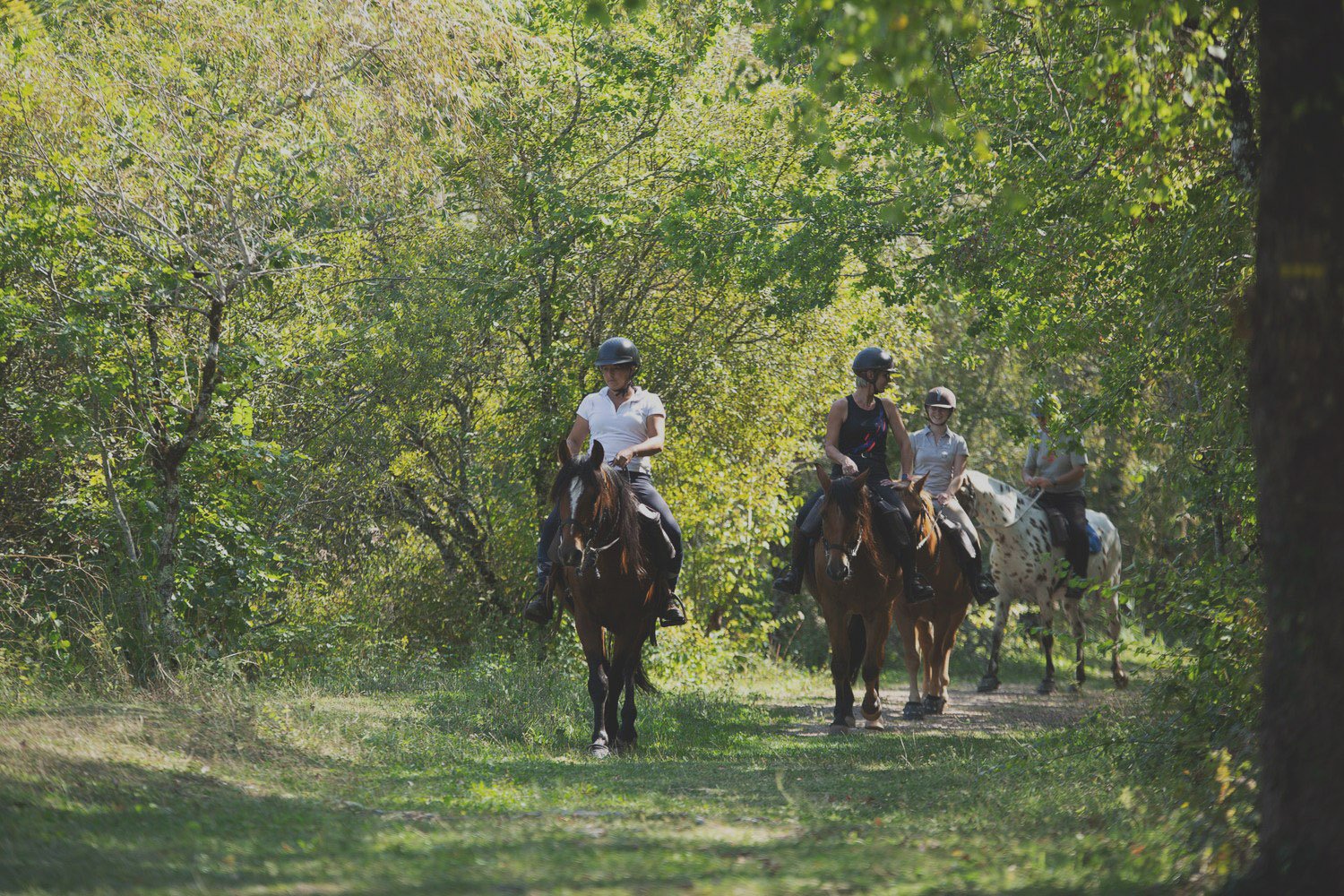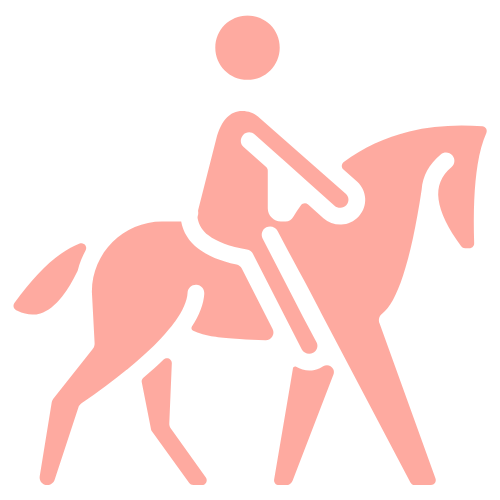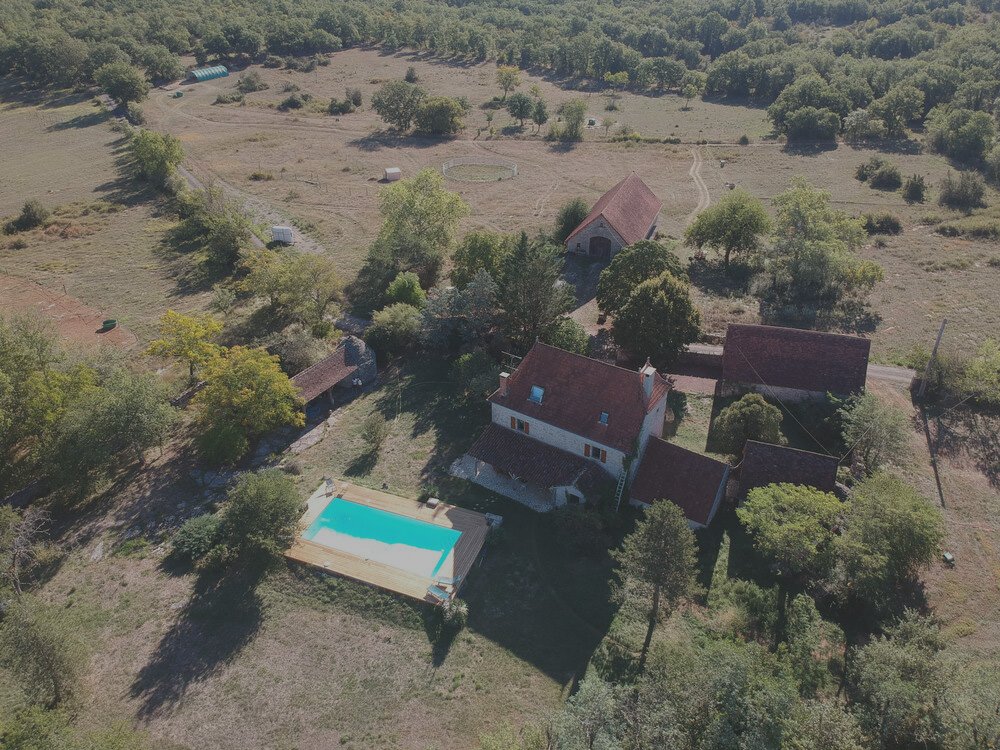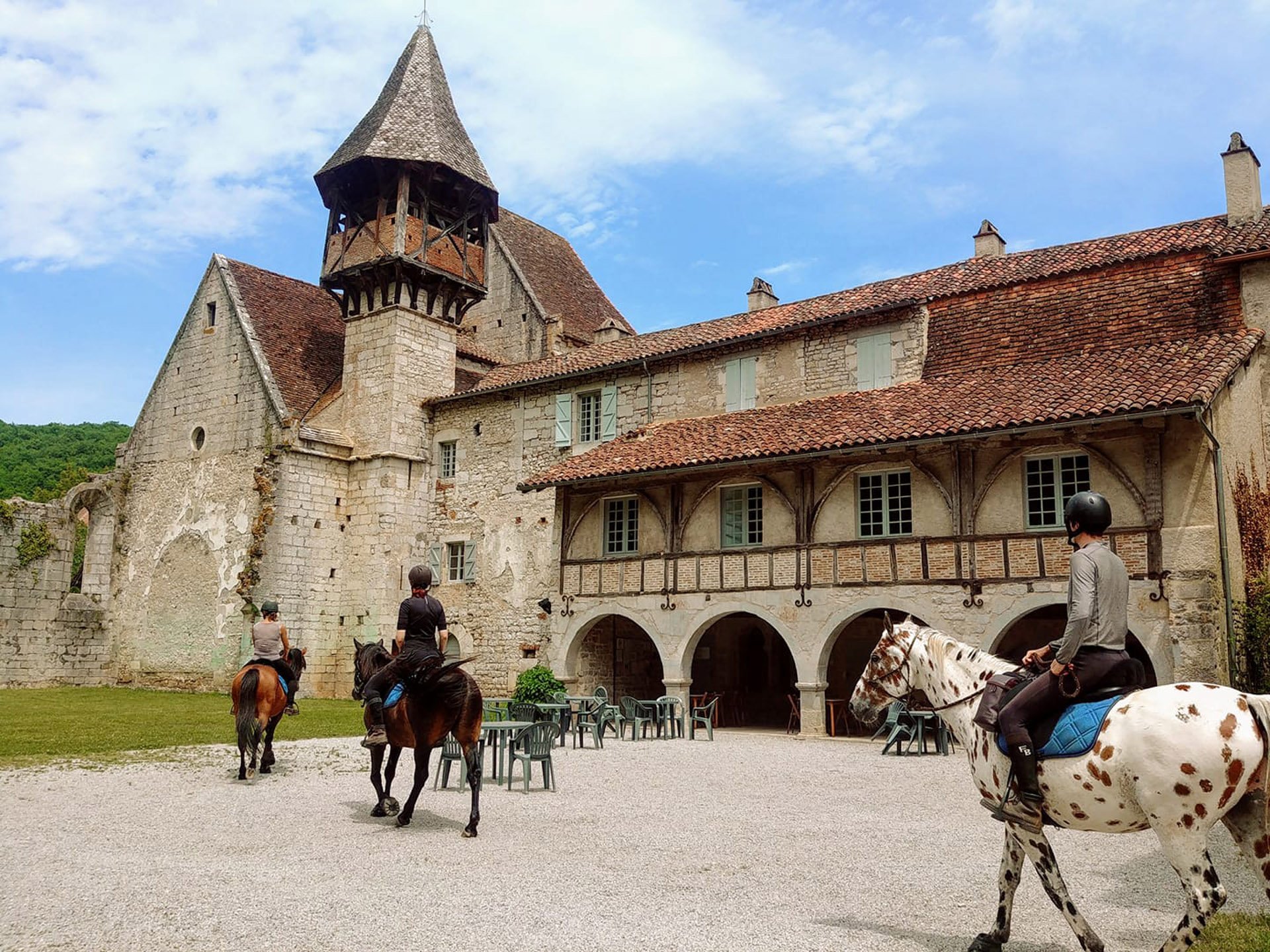Your training centre in the Lot to become
Equestrian tourism guide
Professional qualification issued by the Fédération Française d'Équitation (FFE)
level 4 (Nomenclature Europe) (RNCP file no. 36133 - certification registered on 26/01/2022).
ATE TRAINING
The Mas de Peyrelongue prepares you for the job ofEquestrian Tourism Guide. Discovering the natural and historical heritage of a region on horseback is a multi-faceted activity that our 5-month training course will enable you to master: preparing itineraries, creating your own tourist products, organising logistics, ensuring safety and leading a group... Thanks to our trainers, who are recognised in their field, you will have all the skills you need to work in an Equestrian Tourism Centre or to set up your own structure.
TRAINING MANAGER
Gwladys Lecarpentier
06.49.10.76.38
contact@mas-de-peyrelongue.com
Why choose Mas de Peyrelongue for your ATE training?
- ☑ Full training over 5 months
- ☑ Personalised training path
- ☑ A competent teaching team of 6 speakers
- ☑ A specialised structure: Ethology and Travelling on Horseback Techniques
- ☑ Preparation for FFE 1, 2 and 3 included
- ☑ Leading destination for equestrian tourism in France
- ☑ Post-graduation follow-up and professional integration in France and abroad
- ☑ Possible financing and payment facilities
OUR TRAINING IN BRIEF
Diploma prepared
- ATE: Equestrian Tourism Accompanist
- FFE professional title, level IV (Bac), recognised by the State.
Level required
- Hold a Galop 6 "horseman" or "outdoor" qualification
- To have completed 7 days of hiking.
- To have a first aid certificate (PSC1, AFPS...)
Duration of the course
Total duration: 5 months full time
- Training modules: 455h
- Individual training course: 60h
- Work experience: 210h
Cost of the course
- Course fee: €6370 incl. VAT
- Possibilities of financing and payment facilities (Vivea...)
Support for disabled candidates / trainees
Are you disabled? Le Mas de Peyrelongue can help you with your training. Please have a look at our "Accessibility" policy and contact Jeremy Durand on 06 85 67 85 64.
Training for
Mas de Peyrelongue
Both a training centre and an equestrian tourism centre, Le Mas de Peyrelongue overlooks the Célé valley in the Lot, near Figeac. On an estate of 50 hectares of woods and meadows, more than thirty horses live in semi-natural conditions around a traditional farmhouse.
FIRST TRAINING SESSION
- Preselections on CV + letter of motivation by email to contact@mas-de-peyrelongue.com or by mail: EARL Mas de Peyrelongue 46100 Corn
- Next selection and positioning day: 04/09/2024
- Entrance tests : Information on the next dates and places
- Start date: November 12, 2024
- End of training: April 25, 2025
OUR INDICATORS :
- 100% success rate in general examinations by 2023
- 100% professional integration rate for graduates in 2023
- 96% satisfaction rate among trainees in 2023
THE STRENGTHS OF OUR STRUCTURE
Your training manager
Manager of the Mas de Peyrelongue, Gwladys Lecarpentier has been passionately transmitting her skills in ethology, horse work and equestrian tourism to institutions and professionals in the equine world, both in France and abroad, for over ten years. She is a riding teacher (double BPJEPS Classic and Equestrian Tourism), an ethological riding instructor (BFEE2), holder of a DU in equine ethology and experienced in the techniques of horse travel with more than 8000km of autonomy through Central America, North Africa and Europe.
A 100% outdoor riding facility
The Mas de Peyrelongue is a training centre that offers its own equestrian tourism in the Lot. The whole structure is oriented towards outdoor riding. We don't just teach, we practice!
The teaching team
Throughout your ATE training, you will benefit from the intervention of professionals recognised in their discipline: farriery, trimming, osteopathy, feeding, etc... You will benefit from their expertise and find answers to your most specific questions.
Individual training path and follow-up
- Our ATE courses are conducted in small groups of a maximum of 8 students.
- We respect and encourage your personal training path with a quota of hours dedicated to your personal project.
- We offer a personalised teaching approach to each student.
- Benefit from our network of partner organisations abroad after your degree
Ethology
Our structure and consequently our training courses are fully oriented towards behavioural approaches. Thus, during your ATE training, you will be asked to prepare your FFE 1, 2 and 3 knowledge in ethological riding.
Labelled "Well-being of the horse".
The Mas de Peyrelongue has been awarded the "Well-being of the horse" label by the FFE. We offer our horses a living environment in line with their needs and do everything possible to ensure their well-being at work.
TRAINING MODULES
Module 1: Duration 155h
Handling of the public and supervision of equestrian tourism
- Posture, role and responsibility of the coach
- Regulation of the ATE framework
- Fundamentals of reception and customer information
- Customer relationship and complaint management
- Measurement of customer satisfaction and continuous improvement process
- Characteristics of the public: children, adolescents, adults, seniors
- Characteristics of specific audiences: disability, inclusion, health sport
- Preparing the right equipment for the activity
- Accompanying the public in their first contact with the horse and passing on the rules of hygiene and safety
- Verification of the level of the riders, choice of the horse and the course
- Transmission of safety instructions, traffic regulations and preservation of the natural environment
- Transmission of the technical bases of outdoor riding for the comfort and safety of the riders
- Animation techniques and group dynamics in equestrian tourism
- Adaptation of the activity and the instructions according to the characteristics of the participants and the course
- Management of the speed of movement according to the level of the riders and the prepared route
- Prevention and management of critical situations and anticipation of communication with the emergency services
- Management of stops and stages
- Hiking assistance
- Seamanship techniques applied to equestrian tourism
- Use of different topographic maps, evaluation of distances, interpretation of conventional signs
- Identifying and plotting a suitable route, drawing up a route map, assessing difficulties
- Tracing a Club 1 ROP
- Using a map, application or GPS to orientate or define your position
- Cultural, social, economic and heritage aspects of a route
- Knowledge and preservation of the environment: fauna, flora, natural and agricultural areas
- Meteorological information gathering and interpretation
Module 2: 150h
Equestrian tourism techniques
- Working on foot with outdoor horses (Ethological riding: Knowledge 1 and 2)*.
- Work on the flat of the outdoor horse
- Outdoor work and varied terrain for outdoor cavalry
- Specific equipment for equestrian tourism
- Criteria for choosing and evaluating an outdoor horse
- Use of a handhorse, introduction to tarping*.
- Physical and psychological conditioning of the outdoor horse
- Principles of breaking-in (Ethological Equitation: Knowledge 3)*
- Planning and management of outdoor equine work
- *Specific training for your course at Mas de Peyrelongue
Module 3: 80h
Care and maintenance of horses and infrastructure
- Equine welfare criteria and management, social behaviour
- Knowledge of the horse: locomotor, respiratory, circulatory and digestive systems
- Feeding and watering of horses
- The foot: anatomy, maintenance, routine care, main disorders and accidents
- Basic farriery repairs
- Maintenance and routine care of the horse
- Sanitary regulations and common prophylactic measures: disinfection, vaccination, deworming
- Equine diseases and accidents, poisonous plants and equine first aid
- Management of the pharmacy and human, equine and farrier first aid kits
- Grassland and paddock management
- Regulation of the transport and conveyance of equidae
- Preparation and implementation of equine transport
- Cleanliness, hygiene, maintenance and safety of the equine living areas
- Cleanliness, hygiene, maintenance and security of infrastructures and practice areas
- Basic and emergency repairs in upholstery
- Development of a Club 1 PTV course
MODULE 4: 70h
Business management, institutional and regulatory environment
- Organisation of an equestrian establishment and communication within the team
- Knowledge of equestrian tourism products
- Programming of activities
- Project methodology
- Design of an equestrian tourism product
- Creation, development and registration of a local route in the PDIPR
- Fundamentals of budget management, taxation and profitability of an equestrian tourism product
- Promotion and communication of activities
- Tourism actors and regulations
- Relationship and communication with partners
- Regulation and use of routes and roads
- Actors and institutional environment of equestrian activities
- Insurance liability and regulation
- Notions of starting a business
CAPITALIZABLE UNITS
A CU corresponds to a block of skills mentioned in I of article L. 6323-6 of the French Labour Code.
A certificate of achievement is issued by the FFE when a CU is obtained. For the ATE, there are 3 UC to be obtained:
- UC1: Participate in the operation of the equestrian tourism structure
- UC2: To supervise the activities of equestrian tourism in safetý in the respect of the deontology and the animal well-being.
- UC3: To ensure the education and the management of the equestrian tourism cavalry in the respect of its well being.
ADMISSION REQUIREMENTS FOR ATE TRAINING
ENTRY LEVEL REQUIRED
- To hold at least the Galop 6 de Pleine Nature or the Galop 6 de Cavalier or the Degré 2 de Tourisme Equestre or the Degré 2 de Cavalier delivered by the FFE.
- To have completed 7 days of hiking with a minimum of 4 days without returning to the departure base, certified by a center affiliated to the FFE, or validated on the candidate's electronic hiking log, or to hold the Brevet de Randonneur d'Argent issued after 01/08/2011 or equivalent.
OTHER CONDITIONS
- Be at least 18 years old
- Hold a first aid certificate (AFPS, PSC1, SST...)
- Be a holder of a validated FFE license for the current year for Club level competition.
- Have a medical certificate authorizing the practice and supervision of physical activities and sports dating less than one year at the date of entry into training.
ENTRANCE TESTS
In order to enter the ATE training at Mas de Peyrelongue, you must pass your entrance tests. They include :
- A technical test on horseback which corresponds to a course in varied terrain (PTV) at Galop 6 level in Pleine Nature, from 0.8 to 2 km, comprising 20 difficulties.
- A walking orientation course of 3 to 5 km in a limited time with 8 markers.
- A motivation interview during which the candidate presents his/her experience and motivation to the jury.
SITUATIONAL SETTING
PROFESSIONAL
The ATE training includes a work placement of at least 45% of the training hours. It allows the candidate to familiarize himself with the company environment and to put into practice what he has learned at the training center.
The internship must allow the candidate to approach the following professional situations:
- Development of an adapted professional posture: punctuality, politeness and interpersonal skills, image and cleanliness, rigor and constancy, involvement and commitment, curiosity and questioning, initiative and creativity;
- Reception and care of different audiences;
- Safety supervision of horseback rides and hikes;
- Organization and promotion of activities adapted to different audiences;
- Outdoor horsemanship;
- Care and maintenance of outdoor horses;
- Cleanliness, hygiene, maintenance and security of the equidae's living quarters;
- Cleanliness, hygiene, maintenance and security of infrastructures and routes;
- Preparation for the transport and conveyance of equines in compliance with the regulations in force.
THE
OPENINGS
Following your ATE training, you will be able to :
- Find a job in an equestrian centre
- Considering a business creation project
- Continue your training towards a BPJEPS Equestrian Activities. Indeed, the ATE training course validates the BPJEPS entrance tests as well as the UC 1, 2 and 4.
REGISTRATION TERMS AND CONDITIONS
From this page or on request, you can download, fill in and return the application form, together with all the documents required to complete it. An invitation to the Selection and Positioning Days at Mas de Peyrelongue is sent to the trainee. During this day, the trainee will be asked to ride alongside a horse and practice a mounted relaxation. This assessment will be followed by an interview with the Training Manager and another member of the teaching team. Among other things, this discussion will enable us to position the trainee on a volume of hours dedicated to personalizing his or her training.
At the end of this procedure, Mas de Peyrelongue informs the candidate of its decision to accept or reject the application. If the candidate's application is accepted, Mas de Peyrelongue will propose a training program to enable validation of the full professional certification, taking into account :
exemptions and equivalences to which the candidate is entitled;
previous training ;
acquired skills and/or additional training needs identified in relation to the professional certification being prepared.
The training path proposal includes :
the training modules on offer and their associated timetables, making it possible to identify any reductions or enhancements proposed for each of them;
hours of work experience ;
a provisional timetable identifying training and work placement periods;
an estimate showing the total cost of the training course, including the cost of certification and the cost per training module;
where applicable, and depending on the financing arrangements envisaged by the candidate, any additional documents required by current regulations or the organization likely to contribute to the financing of the training course.
To enter the ATE training course, candidates must hold :
A valid FFE certificate of successful completion of the training entrance test.
A valid federal license.
















